Riccardo De Masellis
Verification of data-aware workflows via reachability: formalisation and experiments
Sep 27, 2019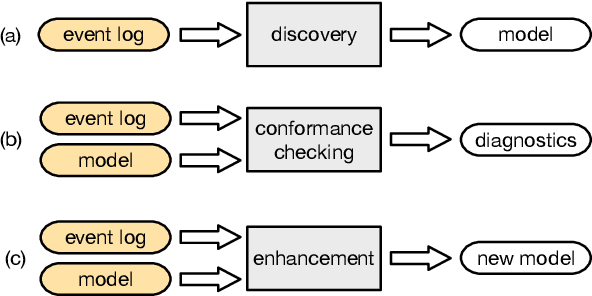
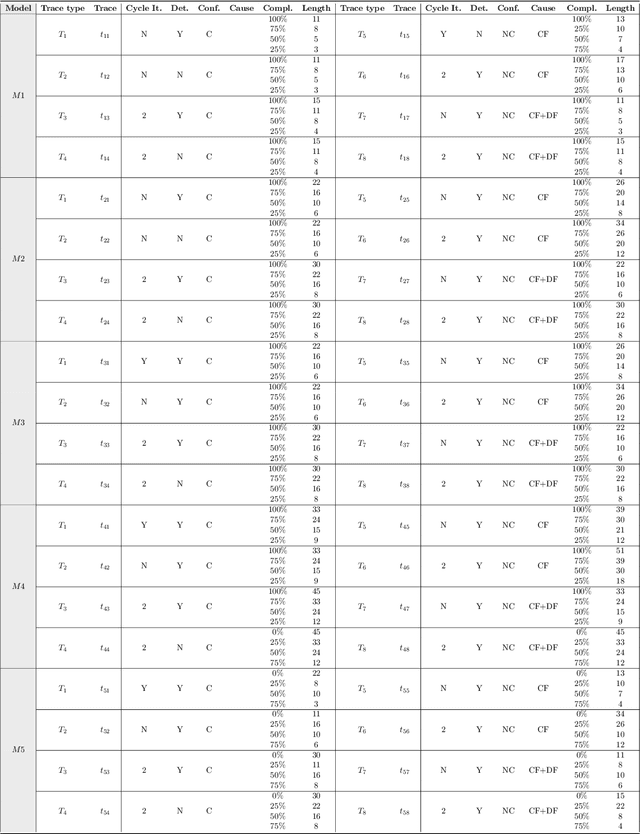


Abstract:The growing adoption of IT-systems for the modelling and execution of (business) processes or services has thrust the scientific investigation towards techniques and tools which support complex forms of process analysis. These techniques rely on observation of past (tracked and logged) process executions but typically: (i) only consider activities, lacking the ability to take into account the data objects manipulated by these activities and (ii) assume complete observations of terminated process executions. In many real cases, however, only incomplete log information is available. This paper tackles these two shortcomings by proposing an approach to exploit reachability to reason on imperative data-aware process models and possibly incomplete process executions. The contribution of this paper is twofold: first, it formulates the trace completion as a reachability problem over data-aware models and second, it provides a rigorous mapping between our data-aware models and three important paradigms for reasoning about dynamic systems, namely Action Languages, Classical Planning, and Model-Checking. This allows us to exploit and extensively evaluate the available tools for the above paradigms to solve the trace repair problem. The rigorous encoding of our data-aware models, based on a common interpretation of the semantics of Action Languages, Classical Planning, and Model-Checking in terms of transition systems, paired with a first comprehensive assessment of the performances of their tools in computing reachability for data-aware workflow net languages, provide a solid contribution to advancing the state-of-the-art on the concrete exploitation of formal verification techniques on business processes.
Enhancing workflow-nets with data for trace completion
Jun 01, 2017

Abstract:The growing adoption of IT-systems for modeling and executing (business) processes or services has thrust the scientific investigation towards techniques and tools which support more complex forms of process analysis. Many of them, such as conformance checking, process alignment, mining and enhancement, rely on complete observation of past (tracked and logged) executions. In many real cases, however, the lack of human or IT-support on all the steps of process execution, as well as information hiding and abstraction of model and data, result in incomplete log information of both data and activities. This paper tackles the issue of automatically repairing traces with missing information by notably considering not only activities but also data manipulated by them. Our technique recasts such a problem in a reachability problem and provides an encoding in an action language which allows to virtually use any state-of-the-art planning to return solutions.
Abducing Compliance of Incomplete Event Logs
Jun 17, 2016
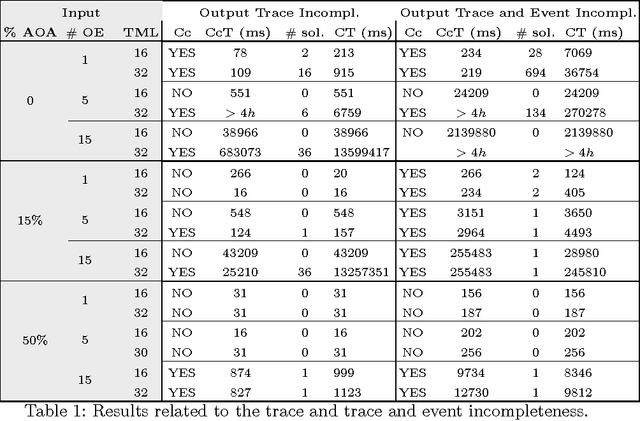
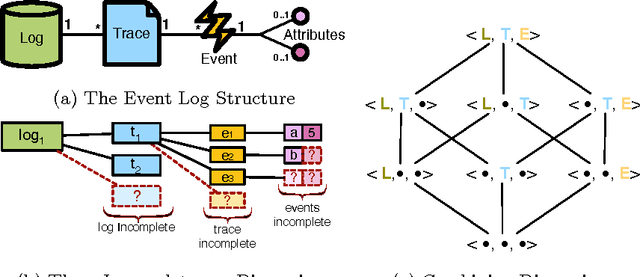
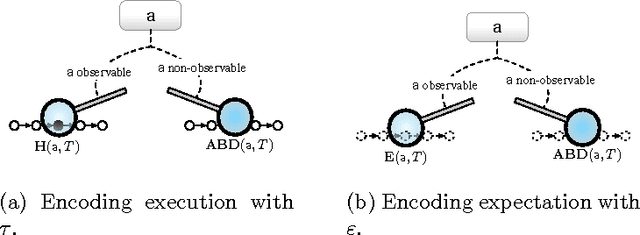
Abstract:The capability to store data about business processes execution in so-called Event Logs has brought to the diffusion of tools for the analysis of process executions and for the assessment of the goodness of a process model. Nonetheless, these tools are often very rigid in dealing with with Event Logs that include incomplete information about the process execution. Thus, while the ability of handling incomplete event data is one of the challenges mentioned in the process mining manifesto, the evaluation of compliance of an execution trace still requires an end-to-end complete trace to be performed. This paper exploits the power of abduction to provide a flexible, yet computationally effective, framework to deal with different forms of incompleteness in an Event Log. Moreover it proposes a refinement of the classical notion of compliance into strong and conditional compliance to take into account incomplete logs. Finally, performances evaluation in an experimental setting shows the feasibility of the presented approach.
LTLf and LDLf Monitoring: A Technical Report
Apr 30, 2014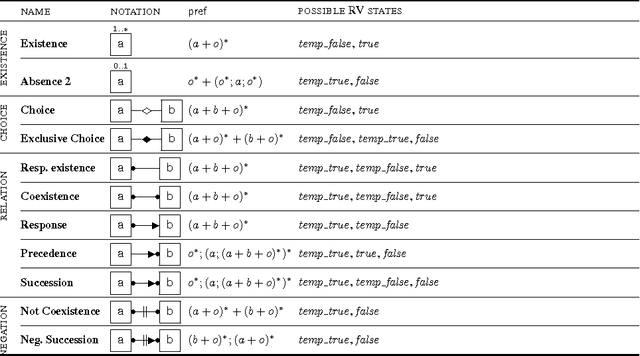
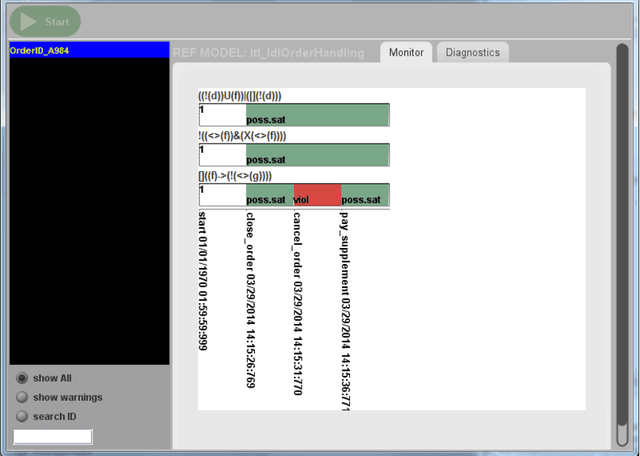
Abstract:Runtime monitoring is one of the central tasks to provide operational decision support to running business processes, and check on-the-fly whether they comply with constraints and rules. We study runtime monitoring of properties expressed in LTL on finite traces (LTLf) and in its extension LDLf. LDLf is a powerful logic that captures all monadic second order logic on finite traces, which is obtained by combining regular expressions and LTLf, adopting the syntax of propositional dynamic logic (PDL). Interestingly, in spite of its greater expressivity, LDLf has exactly the same computational complexity of LTLf. We show that LDLf is able to capture, in the logic itself, not only the constraints to be monitored, but also the de-facto standard RV-LTL monitors. This makes it possible to declaratively capture monitoring metaconstraints, and check them by relying on usual logical services instead of ad-hoc algorithms. This, in turn, enables to flexibly monitor constraints depending on the monitoring state of other constraints, e.g., "compensation" constraints that are only checked when others are detected to be violated. In addition, we devise a direct translation of LDLf formulas into nondeterministic automata, avoiding to detour to Buechi automata or alternating automata, and we use it to implement a monitoring plug-in for the PROM suite.
Description Logic Knowledge and Action Bases
Feb 04, 2014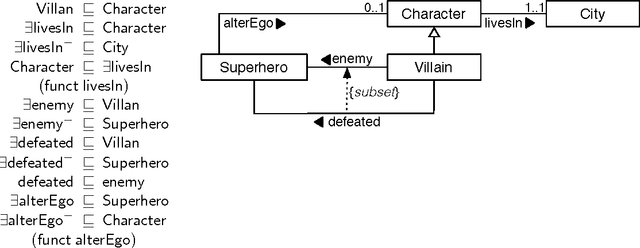
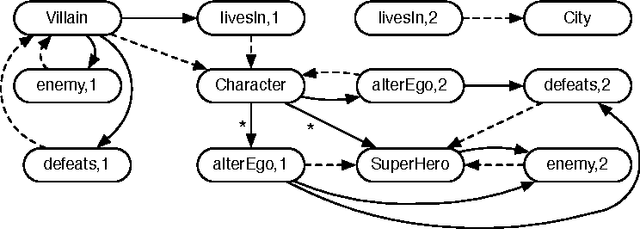
Abstract:Description logic Knowledge and Action Bases (KAB) are a mechanism for providing both a semantically rich representation of the information on the domain of interest in terms of a description logic knowledge base and actions to change such information over time, possibly introducing new objects. We resort to a variant of DL-Lite where the unique name assumption is not enforced and where equality between objects may be asserted and inferred. Actions are specified as sets of conditional effects, where conditions are based on epistemic queries over the knowledge base (TBox and ABox), and effects are expressed in terms of new ABoxes. In this setting, we address verification of temporal properties expressed in a variant of first-order mu-calculus with quantification across states. Notably, we show decidability of verification, under a suitable restriction inspired by the notion of weak acyclicity in data exchange.
 Add to Chrome
Add to Chrome Add to Firefox
Add to Firefox Add to Edge
Add to Edge